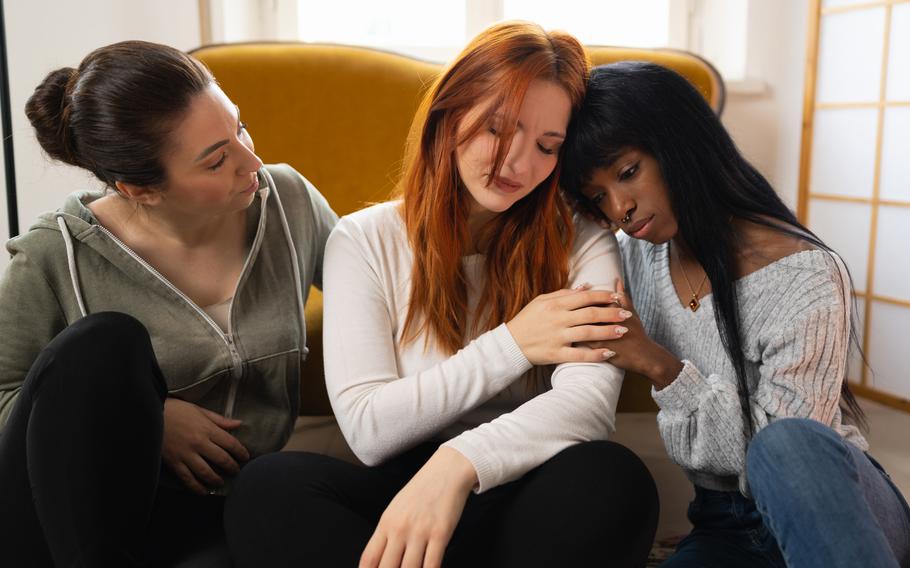
(iStock)
“She’s been acting weird lately,” my 22-year-old daughter, Lilly, said to her friend, Shannon, while they lounged lazily around our kitchen banquette. “I don’t get it. ... I thought the three of us were good friends.” They went on chatting while I buzzed around the kitchen, wiping fingerprints off of the appliances.
As a mom, one of my favorite things has been hanging out with my kids and their friends after sleepovers, listening to their stories and helping to analyze their social dilemmas.
When I was an adolescent, I didn’t talk to my mother about my social life. Not only was Mom busy with her career, kids were taught to respect that parents worked hard and shouldn’t be bothered with trivial things. In the ‘80s, children were to be “seen and not heard” while parents enjoyed their cocktails, cigarettes and “Columbo” reruns.
Conversely, today's parents are more involved in their children’s lives. Naturally, my kids fought my interference when they were teens. But as young adults, they seem to enjoy including me in their conversations.
“Maybe she’s jealous that you two have been getting closer,” I suggested to Lilly and Shannon.
“Yeah, all of a sudden she’s bad-mouthing you. It’s like she wants to turn me against you,” Lilly said to Shannon.
The story sounded all too familiar. I’d experienced problems with friend trios, which often work initially, but often deconstruct, forming new bonds and spitting out a “third wheel.” One friend always loses out.
As a young military spouse and mom, I frequently found myself on the fringe of social groups. But when the kids were small and I was working hard to manage our family chaos during deployments and TDY, I thought I’d finally made a true friend.
We differed in that she was a runner, fashionable and socially in demand. But we had other things in common — both Navy wives and stay-at-home moms with kids the same age. We met at Bunco, then set up playdates. Her second and my third pregnancies overlapped. They asked us to be godparents to their baby girl, and we accepted. Our husbands enjoyed each other’s humor. We had deep conversations on weekends in the driveway, while the kids rode scooters and chased lightning bugs in the cul-de-sac. To me, it felt right.
However, a few years in, a distancing began that slowly unraveled the friendship. More importantly, the distancing unraveled me, exposing surprising character traits in me that I didn’t like.
Although there were many small clues along the way, I recall two specific “hard slaps in the face” — clear indications that my friend was moving on. One Saturday, when our families had plans to meet up, she called and told me her “son was sick.” The next day, her 6-year-old daughter came over to play with Lilly, and I asked, “How’s your brother? Poor guy. Did he throw up last night?”
“No?” she replied, seemingly confused. “The Rogersons came over and we had so much fun!” she smiled. The Rogersons were new friends that I knew, too. “Why did she lie to me? Why couldn’t we all get together?” I thought, my ego bruised.
Another Saturday, four families, including my friend’s family and the Rogersons, were playing cards and drinking beer. A bit tipsy, my friend and the Rogerson wife were calling each other “bestie,” hugging and proclaiming, “I love you!” I felt hurt and confused. Once alone, I cried. “What the hell is wrong with me?!” I thought. “I’m almost 40, for criminy’s sake!”
Our family received orders to Germany, and we eventually lost touch. Through it all, I learned that feeling cast aside by someone I perceived to be “popular” brought out the worst in me. All of my deepest insecurities surfaced. She didn’t mean to hurt me, she simply wanted to make new friends. I needed to find inner strength and confidence to avoid crashing when relationships transitioned, as they often do for military spouses.
“Girls,” I advised Lilly and Shannon, “don’t hide that you two are becoming closer, but be compassionate. The truth may hurt, and she may act weird. But it’s natural for friendships to change. She’ll eventually understand and appreciate your honesty.”
Read more at themeatandpotatoesoflife.com and in Lisa’s book, “The Meat and Potatoes of Life: My True Lit Com.” Email: meatandpotatoesoflife@gmail.com